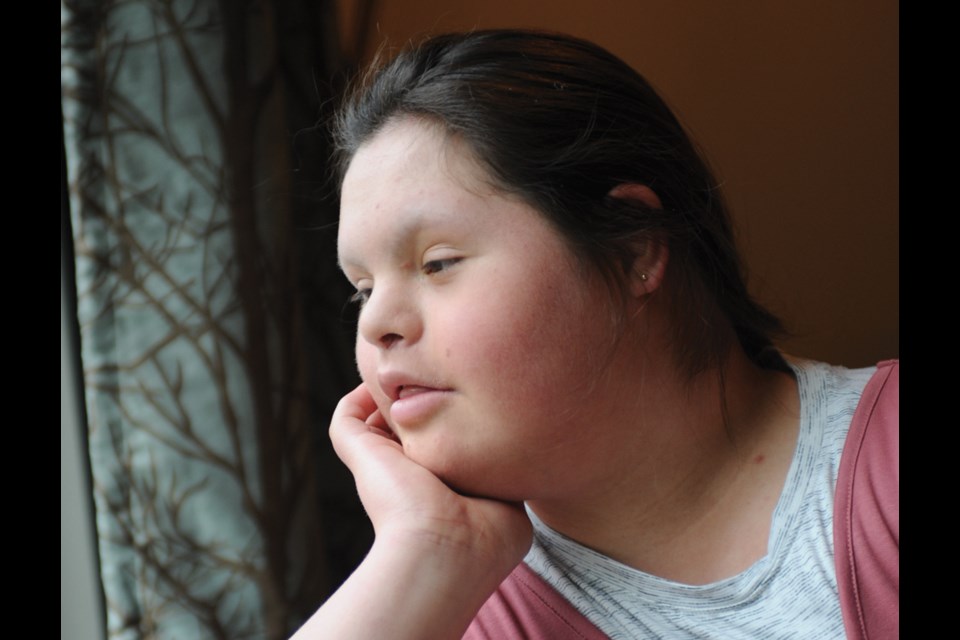Parents of a North Vancouver teenage girl with Down syndrome and autism have filed a complaint with both B.C’s Human Rights Tribunal and B.C.’s Ombudsperson’s Office saying their daughter has been denied an education after she wasn’t allowed to attend school for most of the past year.
Tiffany Paul and Ramses Romero say keeping their 16-year-old daughter Riley, who has complex needs, out of school for so long has been cruel and discriminatory, and has impacted her physical and mental health.
Paul says their daughter “just wants to be a regular kid” in a regular classroom with her peers. “It’s always been where she’s most successful,” said Paul.
But staff with the North Vancouver School District have been dragging their feet on allowing Riley back to class for most of the last year, she added.
Paul said if her daughter were more neuro-typical, she doubts she would have been suspended from school for so long.
“My daughter asks us daily when she is going to be allowed to return to school and we have no answer for her, and it breaks our hearts,” she said.
Anxiety prompted incidents
The family moved to North Vancouver two years ago, said Paul, and Riley settled into Seycove Secondary with the help of a specially trained autism support worker. But when that staff member got reassigned and replaced with another support worker, Riley’s anxiety spiked, said Paul.
In response, she began acting out, culminating in two concerning incidents, including one where Riley broke a window and another where she began hitting objects with a baseball bat.
Paul said the family understood as a result of that, Riley wouldn’t be able to attend school for a while.
Autism supports inadequate, say parents
She eventually returned to school part time several months later, in October 2021, but the supports provided were not adequate, and did not include staff specifically trained in autism, said Paul.
Riley’s mental health had also been affected by being away from school, she said.
In November, during a time when Riley had been put on a new medication, which led to side effects, the most serious incident occurred, when Riley was stopped from jumping out of a second-floor window at the high school.
Riley’s parents were again told she couldn’t attend school.
Following that incident, Paul said Riley’s medication was changed and her mental health stabilized.
The family worked with a medical team that included a pediatrician, counsellor and a psychiatrist at B.C. Children’s Hospital, said Paul. In January, that medical team felt Riley was ready to attend school again.
Bureaucratic runaround
But in the months since, Paul and Romero say they’ve received a bureaucratic runaround from the school district, and been asked to attend countless meetings.
Up until now, however, the best that Riley’s been offered has been either online learning or at-home learning with a school district staff member for a very limited amount of time, said Paul. “It’s been pretty hard,” she said. “We try to keep her busy.”
Riley still misses contact with her peers and regular teachers, said Paul, while her family has forked over $65 an hour for tutors. Both she and her husband have also had to reduce their own hours of work in order to deal with co-ordinating private tutoring for Riley and the school district’s requests, she added.
Appeal filed with Ministry of Education
The family has also filed an appeal to the superintendent of appeals with the Ministry of Education, after the North Vancouver school board upheld a decision to keep Riley from attending class.
Paul said it’s deeply ironic that the same school board recently voted in favour of a policy aimed at ending discrimination against students with disabilities.
The North Vancouver School District refused to comment on the situation or provide general comments on circumstances in which students may be asked not to attend school. But the co-chair of the North Vancouver District Parents Advisory Council, Jennifer Branston, said it's not the only case she's heard about this year.
In written documents provided by Riley's family, school district staff appeared to express concerns that Riley had continued to exhibit suicidal tendencies – an assessment her parents disagree with.
School district staff also disagreed with the family’s characterization of Riley as having been “suspended” from school, stating in those written documents: “Riley’s educational program has been temporarily moved to an online delivery due to concerns of safety and maintaining instructional control.”
Paul said discussions are continuing and she’s still hopeful Riley will get back to school in a meaningful way before the end of the school year.



